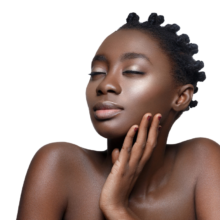What Is Dehydrated Skin & How To Fix It
 What is dehydrated skin?
What is dehydrated skin?
Dehydrated skin is a type of skin that lacks water and moisture. It can appear to look like dry skin, but it’s not. It can affect anybody regardless of skin type, oily, combination, etc.
When your skin is dehydrated, it can look dull and start showing premature aging. It usually feels tight. Here are some signs of dehydrated skin.
Signs of dehydrated skin
There are many signs of dehydrated skin. They include:
Dullness
It can make your complexion uneven and quite dull. You may even look tired and stressed.
Itching
Itching is another common symptom experienced by people suffering from dehydrated skin. Some people even experience scaly skin and patches. These are all signs that show your skin is dehydrated.
Dry Mouth and Dry Eyes
You may also suffer from dry lips and eyes as well cause dehydration problem sometimes comes from your body, not just a skin thing.
Wrinkles, Lines, and Dark Circles
Loss of hydration in the skin can cause loss of elasticity of the skin.
You start having lines and wrinkles if you did not have them before or sunken eyes, or they can become worse if you had them before.
Dry Skin
Dry skin is usually the first sign people notice. Your skin will look dry, and you will think it’s just dry skin you suffer from.
Dehydrated Vs. Dry Skin
You may wonder, Are there differences between dehydrated skin and dry skin? Yes, there is.
With dry skin, the natural oils in the skin are less than normal. Dry skin is also a type of skin. People that have dry skin, their body does not produce an adequate amount of natural oils. These natural oils are also known as sebum.
In dehydrated skin, there is a lack of water in the skin. Moisture and water content are the key here. Dehydrated skin is also not a skin type but a condition caused by something else.
Causes of dehydrated skin

There are many causes of dehydrated skin. Start reducing the cause below, and you may start seeing some small changes. The causes of dehydrated skin include:
- Air conditioner
- Not drinking enough water
- Bathing with hot water
- Using Harsh skin care products
- Weather like winter or harmattan
- and more.
Side effects of dehydrated skin
Dehydrate skin can be quite problematic as it can lead to other problems in the skin, such as:
Inflammation
Dehydrated skin can cause your skin to become inflamed. It can cause discomfort, itching, and redness.
Acne
Since there isn’t enough water in the skin to sweat out toxins and germs, they will collect in the skin and may lead to congestion in the skin, causing pimples and other breakouts.
Sensitivity of the skin
Dehydrated skin can cause your skin to be more sensitive. Your skin may hurt, and you may feel burning sensations easily.
Rashes
Dehydrated skin may also suffer from rashes and redness. Rashes can cause itching and discomfort.
How to tell if your skin is dehydrated (quick test)
A quick and easy test you can do to know if you have dehydrated skin is to do a pinch test. Pinch your skin around the dry area and squeeze for a few seconds, then let go.
Your skin should bounce back after you release. If it doesn’t, it may be dehydrated.
How to fix dehydrated skin

If you are interested in helping revive your dehydrated skin, there are things you can use.
Since I have experienced this before, and I know that drinking water, turning off the A.C, and more don’t help much if the skin is already dehydrated. You need to work on the skin externally as well.
Using certain skin care products with certain natural ingredients that lock in moisture into the skin can quickly help you.
Look for products with these ingredients:
Hyaluronic acid
Hyaluronic acid is a well-known natural substance produced in the body for lubrication. It is usually available in high quantities in the skin, eyes, and joints. It’s the substance that makes babies’ skin so soft. The older we get, the less our hyaluronic acid body produces.
People can also extract it from plants. Buying a product with hyaluronic acid will greatly help to rehydrate your skin.
Check out our natural Hyaluronic acid sheet masks and Hyaluronic acid serum here if interested.
Snail Mucin
Snail mucin is a substance extracted from snails that is amazing for the skin and causes the skin to renew and become moisturized.
It also aids in collagen production and regeneration. Snail also helps with skin healing and rehydration.
The substance is great for anti-ageing as well and is great for all skin types.
See more information on getting a snail product to help your skin hydration and rejuvenation here.
Glycerin
Glycerin is a substance that is great for hydrating the skin. It’s a clear and odorless liquid that you can mix with skin care products to boost hydration.
It is usually derived from oils or animal fats. It’s highly effective in helping to heal rough, itchy skin and skin irritations.
It is great to use on dehydrated skin but better when it is already included in the ingredients of other anti-ageing products as it is mixed in at the best measurements.
Lactic Acid
Lactic acid is a form of organic acid. It’s usually white when solid but becomes colorless when mixed with water. When you add lactic acid to a serum or body cream, the purpose is to hydrate.
It is quite effective in improving hydration when mixed in the right quantities. It can also fight skin conditions and side effects of skin dehydration, such as eczema, psoriasis, and more.
It can also help remove dead skin cells and brighten light spots. It’s best to buy a natural skin care product with it already mixed in the ingredients to get the benefits of lactic acid.
Other natural products that help to hydrate the skin include citric acid, honey, and more.
If you are looking for a product with all these ingredients; check out our snail anti-aging package. It works well to help with skin hydration.
The package contains ingredients like snail mucin, hyaluronic acid, glycerin, honey, lactic acid, and more mixed in the right quantity to help with hydration and anti-aging. Check it out here.
I hope you have enjoyed this dehydrated skin article.
Be sure to speak with a specialist, such as a doctor or a dermatologist, if you try various methods to hydrate your skin without success, as some medical conditions are associated with dehydrated skin.



